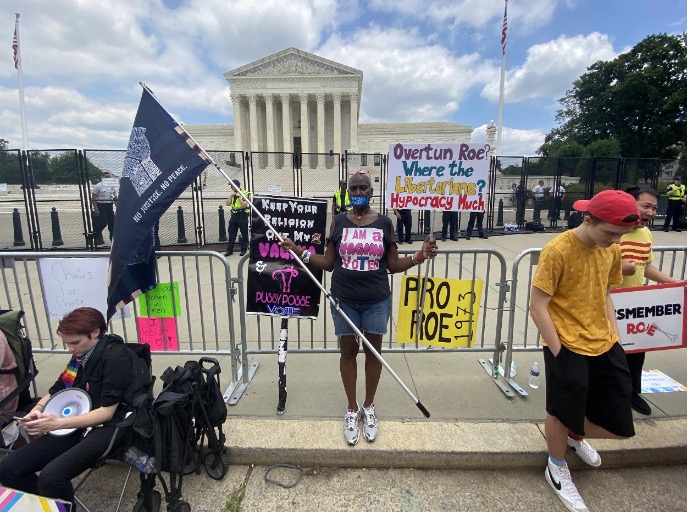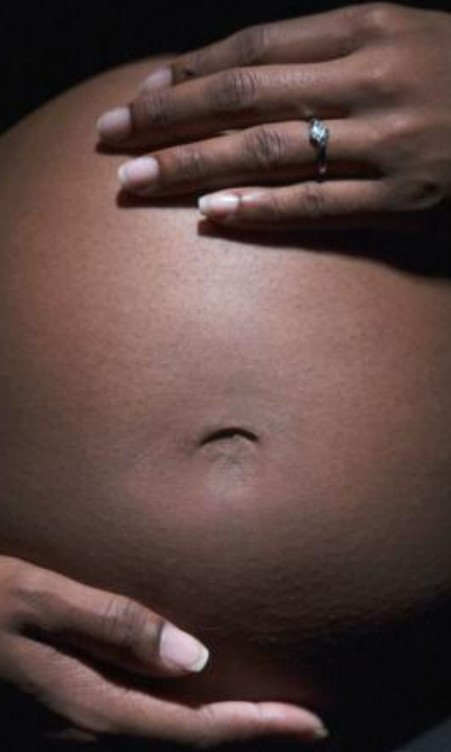
Black Women Harmed Most by Loss of Abortion Rights
Abortion bans, along with limits on reproductive health care and threats to criminalize patients, will especially harm Black women who are poor.
With tape across their mouths, blood on their legs, green protest stickers on their bodies and all manner of signs thrust into the air, women have been taking their rage to the streets over the U.S. Supreme Court’s recent 6-3 vote against the constitutional right to an abortion.
Black women are being disproportionately affected by the decision, which many see as not only part of a larger effort to roll back their reproductive rights, but also voting and other human rights.
“This decision is just a step toward eroding civil rights, because civil right is not enshrined in the Constitution,” said Nadine Seiler, 57, a resident of Waldorf, Maryland, above, after momentarily removing the blue tape stripped across her mouth so that she could comment on why she was protesting in front of the fenced and barricaded Supreme Court building.
As soon as the decision was announced, many women were turned away from abortion clinics around the country or their upcoming appointments were cancelled. More “trigger bans” are are expected to go into effect over the next 30 days. Not only is it more challenging, costly and impossible for some women to travel out of state to receive an abortion, their very lives are at risk.
“For Black women, this decision represents something even more sinister,” warns Linda Blount, president and chief executive of the Black Women’s Health Imperative (BWHI) in her message to the nation.
“For us, losing access to legal abortion could spell the difference between life and death.”
That’s why some demonstrators have been displaying signs with metal hangers, harkening back to the days a half-century ago when they were used in back-alley abortions or even by women themselves who took matters into their own hands. Among women forced to carry a pregnancy to term, they face the risk of already high maternal and infant mortality rates. And those impregnated through rape or incest have little recourse.
The Supreme Court’s vicious decision to overturn Roe v. Wade is one of the darkest moments in the history of this nation.
Make no mistake: While other states strip away the fundamental right to choose, New York will always be a safe haven for anyone seeking an abortion.
— NY AG James (@NewYorkStateAG) June 24, 2022
“The Constitution does not confer a right to abortion,” Justice Samuel Alito wrote in the majority opinion against Dobbs v. Jackson Women’s Health Organization, a Mississippi clinic in a case that now opens the door for states seeking to control reproductive rights.
This decision overrules previous opinions in Roe v. Wade (1972) and Planned Parenthood of Southeastern Pa. v. Casey (1992). Roe and Casey use the 14th Amendment due process clause. Dobbs contests Mississippi’s 15-week restriction on abortion.
With bans expected in nearly half of the country, elected officials from many states and the District of Columbia are welcoming women seeking abortions.
“Washington, D.C., is a proud pro-choice city and access to abortion is still legal here,” Mayor Muriel Bowser tweeted.
“This is about health care,” Bowser said. “This is about women’s rights. This is about bodily autonomy. A majority of Americans believe in a woman’s right to choose. This fight is urgent but not over.”
Letitia James, Attorney General of New York, also took to Twitter. “The Supreme Court’s vicious decision to overturn Roe v. Wade is one of the darkest moments in the history of this nation,” James tweeted. “Make no mistake: While other states strip away the fundamental right to choose, New York will always be a safe haven for anyone seeking abortion.”
Citing the right of choice enumerated and reaffirmed in Roe and Casey, Justices Stephen Breyer, Sonia Sotomayor and Elena Kagan argued in their dissenting opinion that respect of women as full citizens included giving them choice on these personal, consequential decisions.
Despite the initial ruling to protect abortion rights nearly 50 years ago, a draft opinion leaked in early May suggested that the Supreme Court was ready to overturn Roe v. Wade, sparking outrage from abortion advocates throughout the nation.
Aria Harris, 31, a resident of New Carrollton, Maryland, called the court’s action a short-sighted decision. “I personally feel that it’s a travesty in terms of human rights,” Harris said. “There needs to be more empathy on the part of the Supreme Court, and I hope that they reconsider their decision.”
Longtime civil rights activist and D.C. Delegate Eleanor Holmes Norton is outraged by the court’s decision. “Congress must immediately codify the right to abortion in federal law,” Norton said in a statement.
What’s Going on in Your State? Some of the nearly two dozen states that are expected to ban abortions started turning women away immediately after the Supreme Courts decision. More are expected to follow suit over the next month. These states account for roughly a third of abortions performed in the United States. Click here to see an interactive map from the Guttmacher Institute for the latest updates around the country.
Rates for Maternal and Infant Mortality, Already High, Are Expected to Rise
Maternal and infant mortality rates are already disproportionately high among African American women, exceeding rates in some developing nations.
“Given that Black women tend to live in states hostile to reproductive health care, Roe’s overturn directly endangers Black women’s lives by exacerbating pre-existing access restrictions,” said Michelle Webb, Chief Communications Officer of the Black Women’s Health Imperative.
“Forcing Black women to carry dangerous, potentially deadly pregnancies to term will worsen the ongoing Black maternal mortality crisis that sees Black women dying from pregnancy at three times the rate of white women.”
The number of pregnancy-related deaths for Black women is 41 per 100,000 live births compared to 13 for white women, according to the Centers for Disease Control and prevention.
Rates are high for Black women across socioeconomic status, but especially for those with less income and education.

The Economic Impact
Besides the physical risks, abortion bans will take an economic toll, especially on a woman who is Black and poor. “A state can force her to bring a pregnancy to term, even at the steepest personal and familial costs,” argued the dissenting Justices Sonia Sotomayor, Elena Kagan and Stephen Breyer, who will be succeeded on the U.S. Supreme Court by his former law clerk, Judge Ketanji Brown Jackson.
During the half century after the Roe v. Wade decision, women who had access to abortions were able gain more education and resources to take care of their families, according to a report from the National Bureau of Economic Research.
Many women can’t afford to travel to another state for an abortion, which costs $600 out of pocket in some cases. Travel costs can start around $500. A growing number of companies are covering the costs up to $4,000 for workers who have to travel 100 miles or more for treatment.
Women who are forced to have children they can’t afford can be pushed deeper into poverty. Their debt for bills past due for 30 days or more increases by $1,750 a month, the bureau reports in a 2022 update of “The Economic Consequences of Being Denied an Abortion.”
The report estimate that it costs $9,000 annually to raise each child. Women in the study experienced an 81% increase in reports of negative credit reports, evictions, tax liens and foreclosures.
With the threat to abortion rights, more resources will be needed for children, said Bellodgia Roberson, a senior at Langston University. Sarah Beckford, 18, had similar concerns, especially for children who end up in foster care, because their parents are unable to take care of them. Beckford suggests that the government focus more on repairing the foster-care system and less on taking away her rights. “A lot of kids go into the foster-care system and get abused, assaulted and come out even more messed up than they were before,” she said.
%
Increase in Negative Credit, Liens, Evictions
Additional debt 30+ days late
%
Annual Cost to Raise a Child
Travel Benefit at Some Jobs

“Men should not control what women can do with their lives.” — Bellodgia Roberson
Myth
More abortions occur late in pregnancy
Fact
Only 3% to 4% of abortions occur after the 14th week; 43% of abortions occur during the first six weeks, according to the Centers for Disease Control and Prevention.
Contributors: Awura Asamoah, Ashton Brown, Mackenzie Brown-Burns, Zachary Harrison, Shania Muhammad, Mary Solomon and Deonna Wiley. Photo of Nadine Seiler by Mary Solomon/VoicesofTomorrow.news

